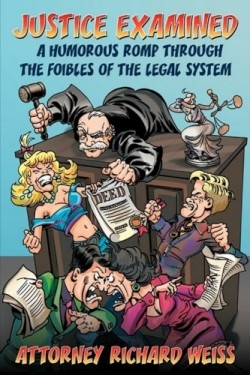Justice Examined
Americans are well aware of lawyers and their many roles. Even those who don’t have personal experience with the law can turn to the countless courtroom dramas and legal thrillers—both real and imagined—on television and at the movies to learn what they need to know. This entertainment education, however, may leave viewers with a skewed vision of how the law works, and what exactly lawyers do.
Richard Weiss attempts to set the record straight in Justice Examined. As an attorney who has practiced in Massachusetts for over thirty years, Weiss knows well that the serious demeanor of lawyers and judges often cracks to reveal a well-developed sense of the ridiculous.
He introduces readers to a judge who doubled his own amount of work by needlessly quizzing every lawyer in his courtroom on irrelevant legal rules. Elsewhere, Weiss records a conversation between a judge and an accuser who wishes to have his dog testify to an alleged act of trespassing. Even more bizarre is the case of the attorney who collected insurance on a box of expensive cigars that was lost in a “series of small fires” and who was ultimately convicted of an arson felony. All over the country, it seems, the legal system is rife with people treating the courts as their own playgrounds.
The stories he includes in his book do not always deliver the humor promised by the title. Readers may find the story about the woman who sabotaged her chance at ophthalmology surgery to be a sad one, or the various tales of people following their suits through to trial in the face of certain loss to be a discouraging commentary on the human tendency toward self-righteousness. Though a few of the chapters are quite fun, Weiss has not succeeded in writing a book that will keep readers giggling from beginning to end.
The author’s writing is fairly comprehensive and he excels at offering detailed, helpful explanations of legal terms and techniques at the beginning of each chapter. Now even non-lawyers can understand Res Ipsa Loquitur, the convoluted process of appeals, and the importance of avoiding conflicts of interest. However, occasional awkward sentence structure may trip up readers of this otherwise enjoyable book.
Weiss takes obvious pleasure in his stories, and his audience will respond to his enthusiasm. He often serves as his own subject and does not mind portraying himself as the lawyerly goof. For example, in the chapter, “Running the Office I,” he describes firing one of his secretaries, who took it rather badly and told him, “You are as dumb as you look!” Later, when he rehires her, he admits, “I guess that definitely proved her point about the dumb part.”
Weiss’s book may not always be funny but it does provide a welcoming window into the daily life and times of lawyers, that special kind of person everyone loves to hate.
Reviewed by
Andi Diehn
Disclosure: This article is not an endorsement, but a review. The publisher of this book provided free copies of the book and paid a small fee to have their book reviewed by a professional reviewer. Foreword Reviews and Clarion Reviews make no guarantee that the publisher will receive a positive review. Foreword Magazine, Inc. is disclosing this in accordance with the Federal Trade Commission’s 16 CFR, Part 255.

